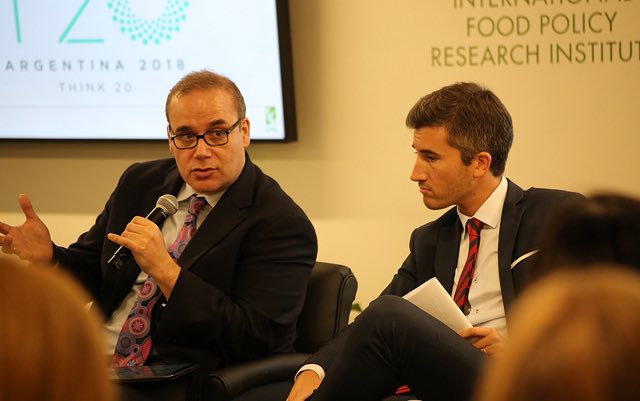Argentine President Mauricio Macri has said that his country will place development, fairness, and sustainability at the forefront of this year’s G20 agenda, setting the theme of the Argentina G20 Presidency as “Building Consensus for Fair and Sustainable Development.” Experts recently gathered at IFPRI for a roundtable discussion on what these themes mean for food production systems, food security, and nutrition.
The G20 brings together leaders from 19 of the world’s most important industrialized and emerging economies, plus the European Union, to discuss current global challenges, including climate change, trade, and food security. G20 countries together account for 85 percent of the world’s GDP, two-thirds of the world’s population, 60 percent of all agricultural land, and about 80 percent of international trade, moderator and IFPRI Senior Research Coordinator Valeria Piñeiro noted.
The organization’s strength lies in the fact that it is not a formal, structured institution, said Eugenio Diaz-Bonilla, head of IFPRI’s Latin American and Caribbean Program, and this flexibility provides leaders with a “sounding board” with which to address their collective problems and create coordinated responses to crises.
This collaborative process has shaped the G20’s evolving approach of food system issues, according to Maximo Torero, executive director for Argentina, Bolivia, Chile Paraguay, Peru and Uruguay, World Bank Group. For example, the issue of food loss and waste was first raised at the Turkey G20 in 2015, Torero said, and now G20 leaders and advisors should move to try to agree on a metric to measure these two problems and to determine where along value chains they occur.
“If we want to implement policies,” he said, “we need to look at where the problem is.”
Agustín Tejeda Rodriguez, chief economist of the Buenos Aires Grain Exchange, agreed. More such evidence-based indicators are needed, he said, particularly to quantify good agricultural practices. This can help policy makers better understand the current food security context and to implement incentives that will boost food security sustainably.
Trade is also key in creating sustainable food and nutrition security, Tejeda said. Global food trade remains hampered by both high import tariffs and non-tariff barriers. Coordinated efforts to expand and liberalize food trade are crucial to ensure the future sustainability of the global food system. IFPRI Senior Research Fellow David Laborde Debuquet agreed, noting that trade liberalization can also indirectly improve food security through the creation of jobs and wealth.
Tejeda suggested that by reaching some consensus on these issues, G20 leaders could contribute to formal trade agreements in the World Trade Organization (WTO) and other forums. To come to a consensus on trade, he said, leaders should think creatively. One option, he suggested, could be to offer to lower import tariffs in exchange for commitments to refrain from applying food export restrictions and to follow sound, evidence-based agricultural practices.
Argentina G20 is well-positioned to help bridge the gap between developed and developing countries’ agendas, Laborde said. While Argentina is one of the smallest economies within the G20 and continues to face development challenges, it is far from the poorest G20 country and has seen substantial export growth, particularly in agricultural commodities. This dual perspective could help the Argentina Presidency “keep Africa on the map,” Laborde suggested.
The panelists agreed that the links between food security, trade, and climate change should be better understood in order to address these challenges in a more balanced and sustainable way. In particular, Diaz-Bonilla said, the policy discussion around food security should encompass nutrition. He also suggested that governments model food system investments such as climate-smart technologies on the financing of infrastructure, coordinating funding from both the public and private sector.
One of the biggest challenges for the Argentina G20 will be to avoid simply putting out “keywords” in lieu of focusing on developing concrete policy actions using evidence-based research, Torero said. For example, he noted that while the topic of soil health has received a lot of attention from policy makers in recent years, most countries still lack proper, up-to-date high-resolution soil maps. The G20 should focus on delivering such concrete public goods on a global basis, Torero said.
The G20 agenda should be more closely aligned with the 2030 Sustainable Development Goal (SDG) agenda, said Astrid Jakobs de Pádua, minister counselor for food and agriculture at the German Embassy in Washington, DC. A variety of stakeholders should participate in this process to ensure that the broad, at times abstract issues the G-20 countries discuss are translated into concrete action at the local level. She said.
Such stakeholders include research organizations and civil society actors. In this light, IFPRI and other institutions contribute to the work of the G20 through the Think 20 (T20) engagement group. During the Argentina G20 presidency, the T20 is being coordinated by two Argentina institutions, the Argentine Council for International Relations (CARI) and the Center for the Implementation of Public Policies Promoting Equity and Growth (CIPPEC). The T20’s goal under the 2018 G20 agenda is to develop policy recommendations relating to infrastructure, gender, migration, climate change, the SDGs, collaboration with Africa, trade, and investment. A summary of the T20 recommendations will be given to the G20 presidency during the T20 Summit, which will take place in Buenos Aires in September 2018.
Sara Gustafson is a Communications Specialist and Valeria Piñeiro is a Senior Research Coordinator in IFPRI’s Markets, Trade and Institutions Division.







